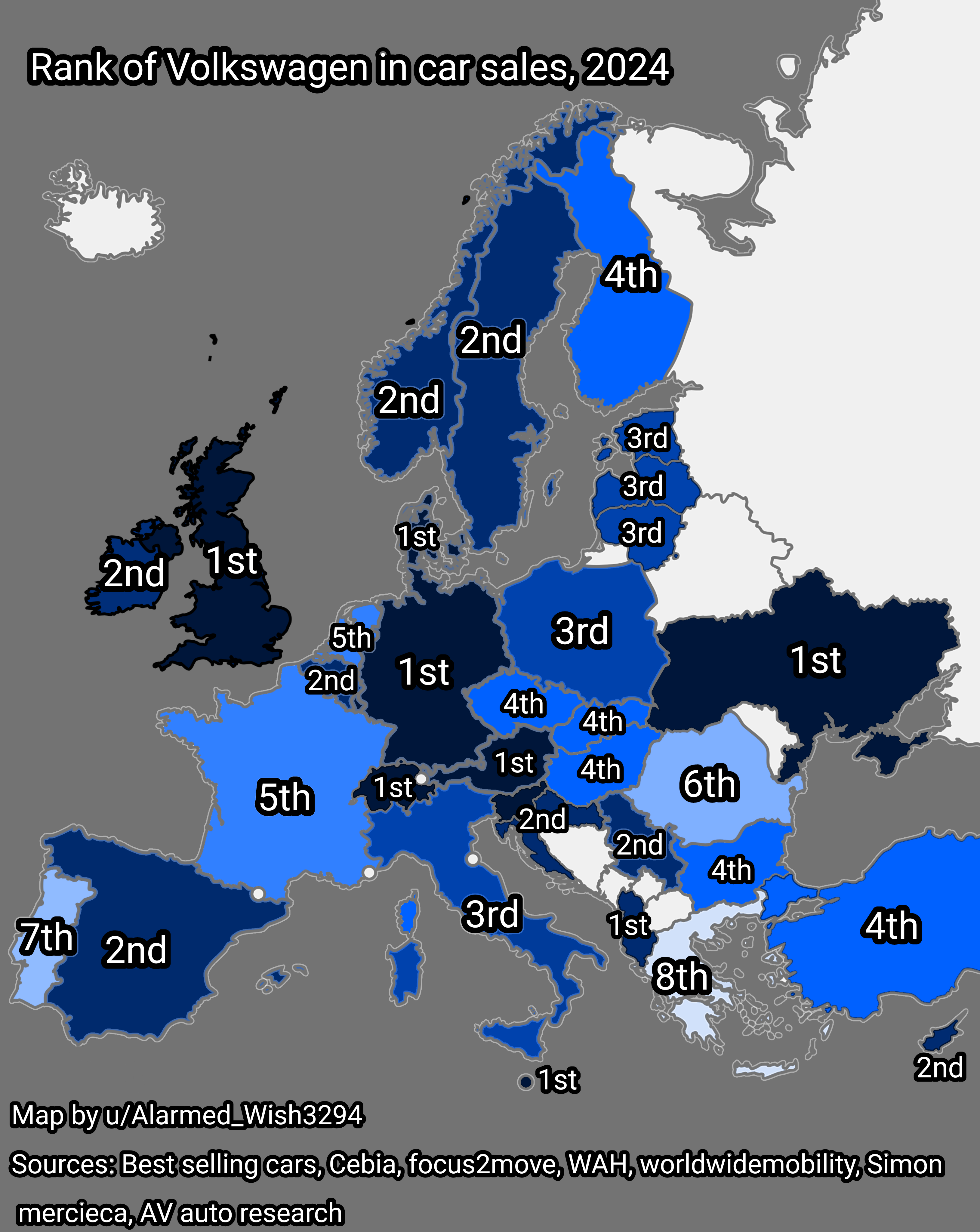Volkswagen Car Sales Rank Map in Europe 2024


David Chen
Data Visualization Specialist
David Chen is an expert in transforming complex geographic datasets into compelling visual narratives. He combines his background in computer science ...
Geographic Analysis
What This Map Shows
The visualization titled "Rank of Volkswagen in Car Sales, Europe, 2024" provides a clear representation of Volkswagen's market position across various European countries in terms of car sales. This map delineates regions by color coding, where darker shades may indicate higher sales ranks, helping us quickly understand Volkswagen's performance in the competitive automotive landscape of Europe. As we delve into this topic, it’s essential to appreciate not just the numbers but also the underlying factors that influence car sales in the continent.
Deep Dive into Volkswagen’s Market Position
Volkswagen, as one of the leading automotive manufacturers globally, has a storied history that dates back to its founding in 1937. The brand has consistently adapted to changing market dynamics and consumer preferences. In 2024, Volkswagen's rank in car sales can be attributed to several factors, including economic conditions, technological advancements, and shifting consumer preferences toward sustainable vehicles.
Interestingly, the ongoing push for electric vehicles (EVs) is reshaping the automotive market. Volkswagen has committed to transitioning toward electric mobility, with significant investments in EV technology. This shift is particularly crucial as European countries enforce stricter emissions regulations, making electric models not just a preference but a necessity for many consumers. In fact, by 2024, the expectation is that the number of electric and hybrid vehicles on the road will increase dramatically, with Volkswagen aiming to sell 1.5 million electric cars annually by 2025.
In terms of sales volume, Volkswagen has traditionally performed well in major markets such as Germany, France, and the United Kingdom. However, competition is fierce. Brands like Renault, Peugeot, and more recently, Tesla, have captured significant market shares, particularly in the EV sector. According to 2023 data, Volkswagen held approximately 13% of the market share in Germany, while in France, this figure dropped to around 9%, showcasing the varying levels of brand loyalty and market penetration across Europe.
Another factor affecting Volkswagen’s sales rank is the economic landscape of Europe. The European Union's recovery from the pandemic and adjustments to inflation rates are influencing consumer spending habits. In countries where economic recovery is slower, such as Italy and Greece, Volkswagen's sales may lag behind competitors who offer lower-priced models or more localized production.
Regional Analysis
Examining the map closely, we see distinctive patterns in Volkswagen’s sales rank across different regions. In Northern Europe, countries like Sweden and Denmark show a strong preference for electric vehicles, which aligns with Volkswagen's recent product launches in this segment. Interestingly, the map indicates that these countries rank Volkswagen higher due to the successful introduction of models like the ID.4 and ID.3, which cater to eco-conscious consumers.
Conversely, in Southern Europe, particularly Spain and Italy, Volkswagen's rank appears lower. This could be attributed to a combination of economic factors and a greater emphasis on smaller, less expensive vehicles, where local brands like Fiat dominate. The cultural preferences in these regions also play a significant role; many consumers prioritize compact cars suited for urban environments, which may not always align with Volkswagen’s current offerings.
In Central Europe, Germany remains a stronghold for Volkswagen. The brand benefits from a deep-rooted national pride in domestic manufacturing and engineering excellence. Here, the map reflects a robust sales rank, highlighting the loyalty of German consumers to Volkswagen. This loyalty is further reinforced by extensive advertising and a well-established dealership network.
Significance and Impact
Understanding Volkswagen's sales rank in Europe is more than just analyzing numbers on a map; it reflects broader trends in the automotive industry and consumer behavior. The movement toward sustainability is significant and will likely continue to shape car sales for years to come. Volkswagen's commitment to electrification places it in a pivotal position to either lead or lag in the upcoming automotive revolution.
Furthermore, the implications of these sales ranks extend beyond the automotive sector. They affect employment rates, manufacturing decisions, and even environmental policies across Europe. With the introduction of the European Green Deal, which aims to make the continent climate neutral by 2050, the automotive industry's adaptation is crucial for meeting these ambitious targets.
As we look to the future, it’s essential to monitor Volkswagen's strategic decisions, particularly how they navigate the challenges posed by competition and economic fluctuations. The 2024 map serves as a snapshot of current dynamics that will inevitably evolve, reflecting the ongoing changes in consumer preferences, regulatory environments, and technological advancements in the automotive sector.
Visualization Details
- Published
- September 2, 2025
- Views
- 92
Comments
Loading comments...